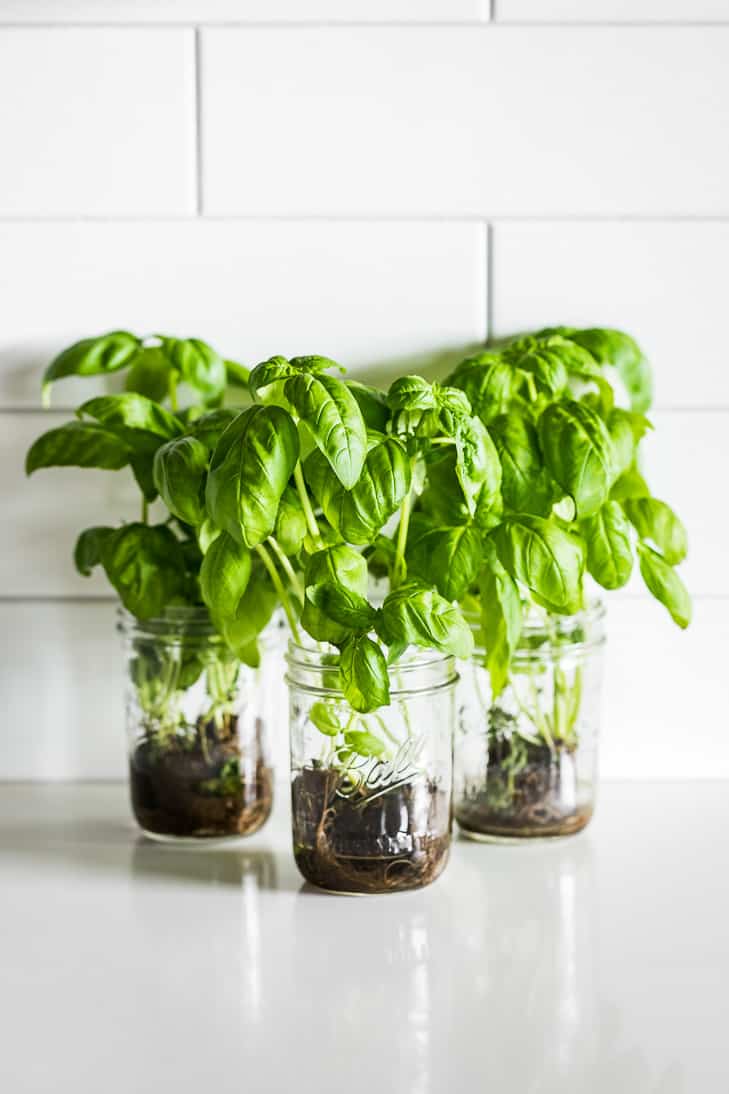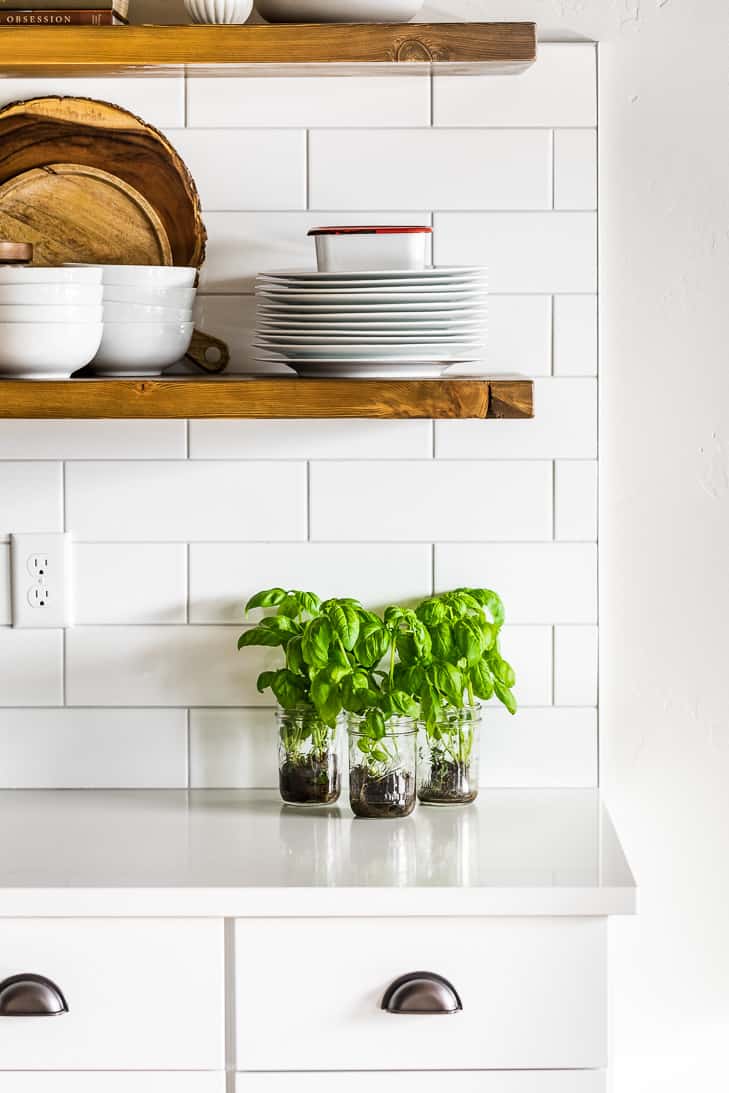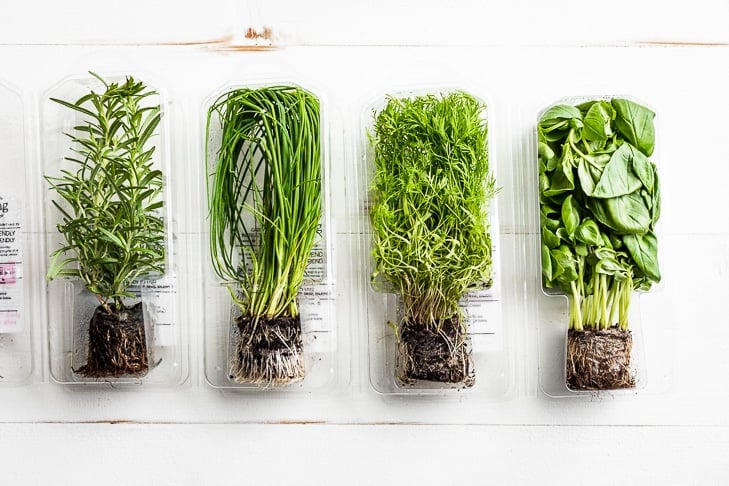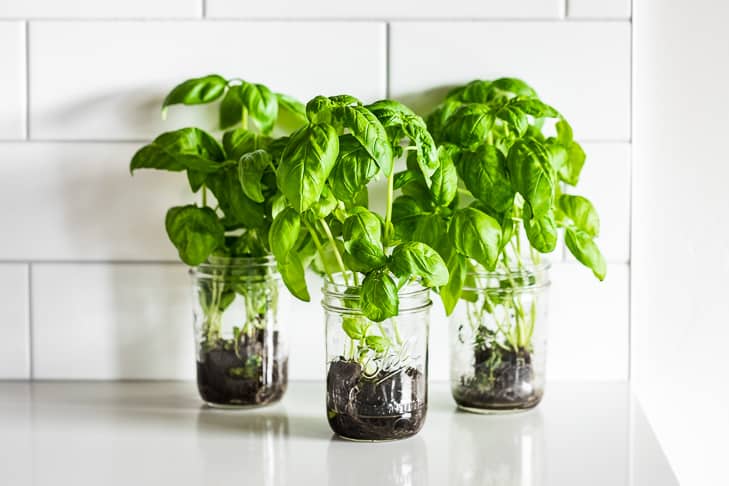I’ve put together all my best tips and tricks in this guide for How To Maintain Living Herbs for months at a time! Plus you’ll find lots of recipe inspiration below as well for how to use them.

Living herbs are a great way to have more fresh herbs available without so much waste. It seems every time I buy a package of basil, it turns brown within a couple of days. (Maybe it’s because we live up north and our produce isn’t always the freshest – who knows?)
So… I started my living herb collection with basil being our favorite. Just last week, I used a few leaves for Saucy Italian Baked Eggs and Fresh Vietnamese Salad Bowls. Living basil costs $4.98 for 1 bunch here versus $2.98 for a package of cut basil.
It ends up being way more affordable in the long run to buy the living herbs because some of them last for 6-8 weeks for me. And if I don’t harvest too much from then at once, they’ll even last up to 3 months! Also if you end up buying living rosemary or thyme to store in the refrigerator, they last much longer than cut herbs. So depending on prices where you live, having more herbs in the fridge is now more affordable.

There’s a few key points when it comes to how to maintain living herbs:
- Don’t fill the water level too high in your container. You only want to cover the roots, if you submerge the stems they will rot and the plant will die. I water my plant every 2-3 days depending on how much sun we get.
- I’ve found that quart mason jars make the best containers for keeping your living herbs alive. The living herbs available where I live always come with fairly long stems. This makes them kind of floppy if left to their own devices. The quart mason jars are just tall enough that they provide some stability to hold up my plants.
- Try not to pick too many leaves at one time! I’ve tapped out several plants with my over neediness (especially the basil). Living herbs grow slower here than my garden herbs do in the summertime, so it’s best to let them recuperate for a few days in between pickings.
- Sun for a couple hours a day is ok, but sun all day everyday will bleach out your leaves. They’ll still taste fine but they might look a bit different than usual. When you’re keeping living herbs in water, they love indirect light for the better portion of the day.
- When harvesting you herbs, you always want to trim back to where there are two new leaves starting. This helps the plant branch out and grow bigger. If you cut back too far the plant won’t regrow itself. And should any flowers appear, definitely pinch them off. If a plant flowers and goes to seed, it will stop producing (this actually applies to all plants). Also, to keep your plants producing be sure to trim any dead parts of the plant back. A few stems die every time I get a new plant. I just trim them back to keep them from getting slimy and ruining the healthy stems.
- There will come a time where your herbs are going to be tapped out. After all, you’re just keeping them in water. If it’s been over a month, your plant is looking pale, and it’s no longer producing much – it’s time to purchase another plant.
- When you go to buy your plant’s from the grocery store, diligently guard them from being smashed by your other groceries. Living herbs are fairly fragile, so I always carry mine out of the store, and never let them put your herbs in with the other groceries at the checkout. This is key! If they come home really damaged, you’re more likely to loose them!
- Also be aware of the outdoor temperature when you’re bringing home living herbs. When it’s below zero outside, these delicate hot house grown living herbs might not even survive the the trip to the car. Be sure to protect them the best you possibly can when it’s below freezing.
- You can actually plant your living herbs in potting soil if you like. My mom always brings in some basil indoors from her garden in the fall. When that plant runs out, she purchases living herbs from the store and puts them in pots to get her by until spring comes again. I prefer to keep mine in water in the mason jars because they are the perfect size to sit on my windowsill.

Which herbs last the best in water? And which are better refrigerated or planted?
- Basil has by far and away been my most successful living herb that I’ve kept in water. I’ve been experimenting with this for 8 years now and it’s the only herb I’ve had 100% success with.
- Mint has also done well for me in water, but be sure to look to see if there’s bugs on the living plants you’re selecting. For some reason the living mint we get here often comes with bugs. This is problematic both for your mint and for any other herbs it might get close to after you get home.
- Rosemary, sage, & thyme don’t really like being kept in water. They’re a hard woody stem and tend to go bad faster when you keep them in water. If you keep the root ball attached to the plant in it’s container in the refrigerator, they do well for a couple of weeks. They’re also great candidates to plant in potting soil.
- Chives & dill have been hit or miss for me. So far I’ve found they do best refrigerated. I haven’t had much success keeping them in water, and planting them in soil isn’t much better.

I’m not sure how many mason jars full of herbs I can fit on my best window spot. But I’m sure trying to add to the collection, (4 herb plants and counting!). And I’m hoping to add mint this week if it’s back in stock.
Inspiration for recipes using fresh herbs:
- Instant Pot Broccoli Cheddar Chicken & Rice (chives)
- Easy Sriracha Tuna Salad (chives)
- Summer Strawberry Kombucha Mocktails (mint)
- Pineapple Cucumber Green Smoothie (mint)
- Thai Basil Turkey Lettuce Wraps (basil)
- Lemon Basil Grilled Chicken & Veggies (basil)
- Rosemary Sea Salt Roasted Almonds (rosemary)
- The Best Rosemary Potatoes (rosemary)
- Sweet Potato Sausage Apple Hash (sage)
- Browned Butter Maple Sage Carrots (sage)
- Creamy Dairy Free Clam Chowder (thyme)
- Creamy Dairy Free Tuscan Chicken (thyme)
What’s your favorite fresh herb to use in cooking?
This post was originally published in 2014, and has been updated with more information and new photos in 2021.
